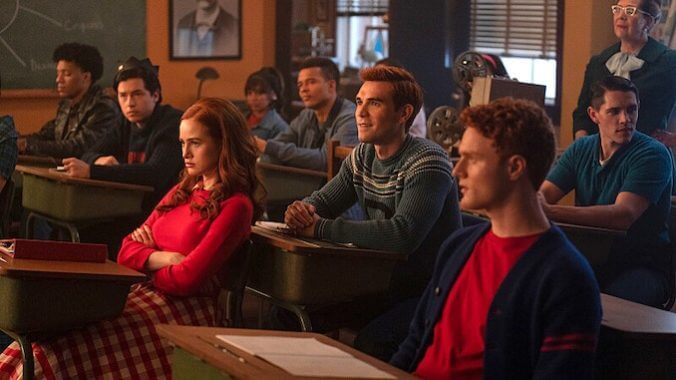Riverdale’s Seventh and Final Season Is a Heartfelt Love Letter to All That’s Come Before
Photo Courtesy of The CW
Travel back in time with me: it’s 2017 and teen TV is better than ever. Pretty Little Liars, The Vampire Diaries, and Teen Wolf are all building up to their epic conclusions to come later that year, but not before a January mid-season premiere on The CW changes teen TV as we know it. Six seasons and just as many years later, it’s almost difficult to remember Riverdale’s humble origins as what was simply a dark and gritty Archie Comics adaptation at the time. Now, Riverdale stands as the last of its kind, the only bonkers, 22-episode teen drama left, and it’s not slowing down in its final season.
Picking up just two days after (and, simultaneously, 67 years before) Riverdale’s stellar sixth season finale, which saw Cheryl (Madelaine Petsch) attempt to use the combined power of her friends to melt a comet headed straight for Riverdale, Season 7 drops our favorite Riverdaliens into the 1950s, with not a clue as to their lives before. Well, except for Jughead (Cole Sprouse), who remembers everything: the comet, the powers, Percival Pickens, cell phones, the Internet, all of it—including the pasts and personalities of his once-superpowered friends. But in the ‘50s, some of them are different to what Jughead remembers: Archie (KJ Apa) is now the epitome of the all-American boy-next-door, Veronica (Camila Mendes) is a Hollywood starlet whisked away from LA to attend Riverdale High, Betty (Lili Reinhart) is herself still the girl-next-door, now dating Kevin (Casey Cott), Toni (Vanessa Morgan) and Fangs (Drew Ray Tanner) are Serpent greasers, Tabitha (Erin Westbook) is an activist, and Cheryl is still a hot-headed twin, but to a different other half in Julien (Nicholas Barasch). Alone in his knowledge and with seemingly no way out, Jughead must do his best to blend in with his surroundings, and embrace his new vintage reality.
In just the first three episodes available for review, Riverdale once again delivers earnest heart with a heaping side of ridiculousness. The premiere is moving and fun, featuring a distinct social commentary throughout that proves that Riverdale is not simply venturing into the ‘50s without thought or care. The series takes this new setting and, with a lightness of touch and a certain deftness, examines the political state of 1955, particularly for the series’ Black cast. After Morgan spoke out in 2020 about the show’s handling of Toni, the storyline Riverdale has presented for her as well as Tabitha and newcomer Clay Walker (Karl Walcott) is a refreshing change of pace. As the season goes on, hopefully their storylines will continue to be central, especially considering the fan-favorite status that Toni and Tabitha both share. As far as the show’s queer characters, it is frustrating to see Kevin and Cheryl shoved back into the closet, but Riverdale is handling their storylines with a serviceable amount of grace so far (even if the Cheryl and Archie scenes are hard to stomach). Yes, Riverdale is the “highs and lows of high school football show,” but it’s also so much more than that, as proven through these first three episodes. It’s bitingly self-aware, and in its seventh season, genuinely earnest and heartfelt.
In some ways, this version of Riverdale presented in just these three opening chapters feels like what could have been if Riverdale was a truly comic-accurate adaptation of Archie Comics, complete with the sweaters, sock hops, grounded teen drama, and distinct lack of organ-harvesting cults (so far). Though, on a show where the craziest things anyone could ever possibly imagine have already happened, grounded, earnest, and emotional teen drama is as subversive as Riverdale could get. Of course, that doesn’t mean the series is wholly unrecognizable, and Episode 3’s Sex Ed-focus offers some classically horny and unhinged shenanigans on par with the Riverdale we know and love.
-

-

-

-

-

-

-

-

-

-

-

-

-

-

-

-

-

-

-

-

-

-

-

-

-

-

-

-

-

-

-

-

-

-

-

-

-

-

-

-








































